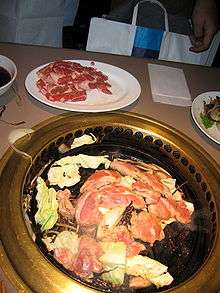Jingisukan

Jingisukan (Jingiskan ジンギスカン) "Genghis Khan" is a Japanese grilled mutton dish prepared on a convex metal skillet or other grill. The dish is particularly popular on the northern island of Hokkaidō, in China and in Thailand.
Etymology
The dish is rumored to be so named because in prewar Japan, lamb was widely thought to be the meat of choice among Mongolian soldiers, and the dome-shaped skillet is meant to represent the soldiers' helmets that they purportedly used to cook their food.
In 1918, according to the plan by the Japanese government to increase the flock to one million sheep, five sheep farms were established in Japan. However, all of them were demolished except in Hokkaido (Takikawa and Tsukisamu). [1] Because of this, Hokkaido's residents first began eating the meat from sheep that they sheared for their wool.
There is a dispute over from where the dish originated; candidates include Tokyo, Zaō Onsen, and Tōno.[2] The first Jingisukan dedicated restaurant was a Jingisu-sō成吉思荘 ("Genghis House") that opened in Tokyo in 1936.[3]
Gallery

 Pan for Jingisukan
Pan for Jingisukan Jingisukan Restaurant in Malaysia
Jingisukan Restaurant in Malaysia Golden Copper Pan for Jingisukan
Golden Copper Pan for Jingisukan
See also
References
- ↑ "STUDY ON THE SHEEP BARN WITH GAMBREL ROOF IN TAKIKAWA SHEEP FARM BY DEPARTMENT OF AGRICULTURE AND COMMERCEAI". AIJ J. Technol. Des. Vol. 17.
- ↑ "なんで「遠野名物」なの?". Retrieved 2008-06-22.
- ↑ "調査報告その3 ルーツを探る". Retrieved 2008-06-22.
External links
| Wikimedia Commons has media related to Jingisukan. |
- Jingisukan, mutton barbecue - City of Sapporo
- Jingisukan barbecue restaurant